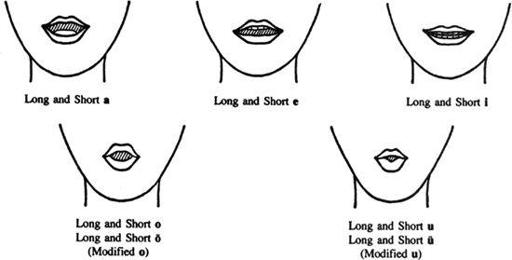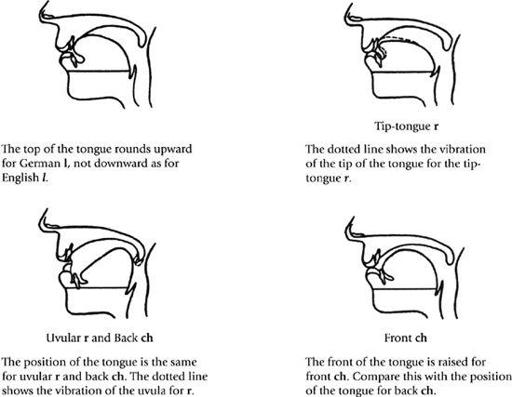German Made Simple: Learn to Speak and Understand German Quickly and Easily (2 page)
Read German Made Simple: Learn to Speak and Understand German Quickly and Easily Online
Authors: Ph.d. Arnold Leitner
Tags: #German Language

Die Geographie von Deutschland, Österreich und der Schweiz
THE GEOGRAPHY OF GERMANY, AUSTRIA AND SWITZERLAND
Expressions of geography—Imperative in the first-person plural—Comparison of adjectives—Some adjectives irregular in comparison—Case endings in the comparative and superlative—Sights in Germany, Austria, and Switzerland.
Die Deutsche Küche
GERMAN COOKING
The
am -sten
form of the superlative of adjectives—Comparison of adverbs—A recipe:—
Apfelkuchen
.
Welche Städte Werden Sie Besuchen, Herr Clark?
WHAT CITIES WILL YOU VISIT, MR. CLARK?
The future tense of modal auxiliaries—The future perfect tense—Making predictions.
Herr Clark Reist Nach Deutschland Ab
MR. CLARK SETS OUT FOR GERMANY
Two word families—About the verbs
lassen
and
verlassen
—Map of Germany.
Summary: Verbs (principal parts), German expressions—Vocabulary exercises—Grammar review and exercises: Case endings for the comparative and superlative of adjectives—Five tenses of verbs—Dialogues:
1. Deutsche oder amerikanische Filme? 2. Im Restaurant—Modernes Lesestück: Frau Clark shoppt im Internet
.
Ankunft in München
ARRIVAL IN MUNICH
Am Flughafen
At the Airport—
Willkommen in Deutschland
Welcome to Germany—The present participle used as an adjective—More
sein
-verbs.
Herr Clark Besucht die Familie Schiller
MR. CLARK VISITS THE SCHILLER FAMILY
Ein Telefongespräch
A Telephone Conversation—
Eine Vorstellung
An Introduction—Prepositions with special meanings after certain verbs.
Ein Ausflug an den Ammersee
AN EXCURSION TO THE AMMERSEE
Automobile terms—Informal letters: beginnings, endings—More strong verbs, principal parts—Principal parts of modals—The double infinitive—The double infinitive with
lassen, sehen, hören
.
Herr Clark Verlässt Deutschland
MR. CLARK LEAVES GERMANY
Summary of German word order in simple sentences and main clauses—Summary of word order in subordinate clauses.
Summary: Verbs, German expressions—Vocabulary exercises—Dialogue:
An der Tankstelle
At the Gas Station—
Lesestücke: 1. Das deutsche Fernsehen. 2. Herrn Clarks Rheinreise
.
Brief an einen Freund in Chicago
LETTER TO A FRIEND IN CHICAGO
About the subjunctive—The present subjunctive—The past subjunctive—The present perfect and past perfect subjunctive—The
würde
-form—Use of the subjunctive in conditional sentences—Word order in conditional sentences—Omission of
wenn
—Daydreaming:
Wenn ich
…
Bericht eines Gesprächs zwischen Herrn Clark und Herrn Müller
REPORT OF A CONVERSATION BETWEEN MR. CLARK AND MR. MÜLLER
The subjunctive in indirect discourse.
Was Geschieht im Hotel?
WHAT HAPPENS IN THE HOTEL?
1. GERMAN AND ENGLISH BELONG TO THE SAME FAMILY OF LANGUAGES
As you proceed in your study of the German language you will note many resemblances to your native English in vocabulary, idioms and grammatical structure. This is not strange, for German and English belong to the great Germanic family of languages. They are in fact language cousins. The many resemblances between German and English will be a great help to you in acquiring a good German vocabulary and in other phases of your language study.
2. RELATED GERMAN AND ENGLISH WORDS
Some of the most common German words, often repeated in everyday speech, closely resemble English words of the same meaning. The pronunciation differs, of course, but this will offer few difficulties, as you will see when you make a thorough study of German pronunciation in
Chapters 2
,
3
,
4
.
a. Some common nouns. Note that all nouns are capitalized in German
.

b. Some frequently used adjectives

c. Some frequently used verbs
The infinitive of all German verbs ends in
-en
or
-n
. Remove these endings from the following German verbs and note the remarkable resemblance to English verbs of the same meaning.

3. GERMAN IS NOT DIFFICULT TO PRONOUNCE AND SPELL
German is a phonetic language. This means that words are generally pronounced as they are spelled and spelled as they are pronounced. There are no silent letters except
e
in the combination
ie
, and
h
, which is silent when used after a vowel to indicate that it has a long sound. This is so much simpler than in English, where such words as
height, weight, cough, rough, dough, knight, could
, etc., make English spelling and pronunciation a difficult task for the foreigner.
Each German vowel has a long and a short sound. Thus: German
a
is either long, like
a
in
father
, or short, like
a
in
what
. German
a
is never like
a
in
hate, a
in
tall, a
in
mare
, or
a
in
back
.
Most German words are stressed (accented) on the first syllable. Thus:
Gar
-ten,
On
-kel. When the first syllable is not stressed, an accent mark will be used in the vocabularies to show the stressed syllable. Thus:
Papíer
(pa-
peer
) paper.
In
Chapter 2
the German sounds and their spelling are explained in detail, with suitable exercises for practice in words and sentences. These should enable you to pronounce quite well. If possible you should get some German-speaking person to help you with your pronunciation, for it is important for you to hear the sounds correctly spoken and to have your own pronunciation checked.
You can improve your pronunciation and understanding of the spoken word by listening to German radio broadcasts and CDs, by attending German movies wherever possible, and by watching German DVDs.
LIP POSITION OF THE GERMAN VOWEL SOUNDS
(Description in
Chapters 2
and
3
)

THE GERMAN CONSONANTS
L, R,
and
CH
(
Description in
Chapters 2
and
3
)

4. A PREVIEW OF SOME INTERESTING FEATURES OF GERMAN
a. German grammatical gender
In English a male person is masculine in grammatical gender, and we refer to the person as
he
; a female person is feminine in gender and we refer to the person as
she
. All things are neuter and we refer to each thing as
it
. However, we do sometimes personify things such as cars, ships, etc., and refer to each such thing as
she
. Thus: She (the car) goes beautifully. She (the ship) is a beauty.
In German the matter of grammatical gender is quite different. Gender does not depend entirely on sex. The noun for a male is generally (not always) masculine in gender, the noun for a female is generally (not always) feminine in gender. Nouns for things are not always neuter. Some are masculine, some are feminine and some are neuter.
b. “the” and “a (an)” in German
The German word for the definite article “the” is very intriguing. The English word for “the” never changes. The German word for “the” has six forms, depending on its use in the sentence. Thus:
der
is used with masculine nouns,
die
with feminine nouns and
das
with neuter nouns in the nominative case. Here are a few samples to whet your appetite.
